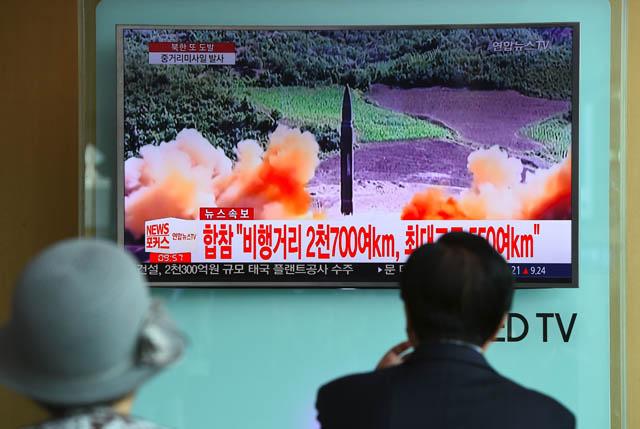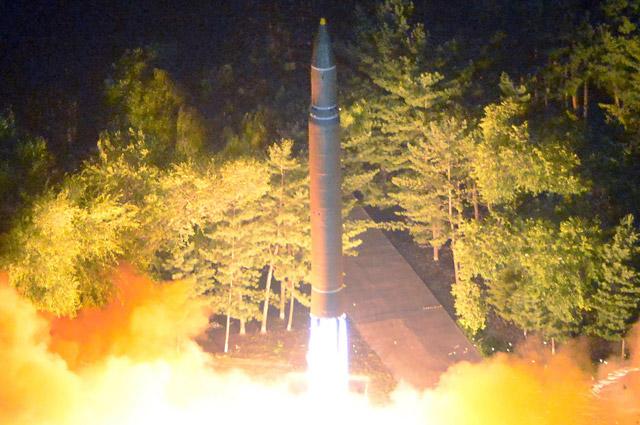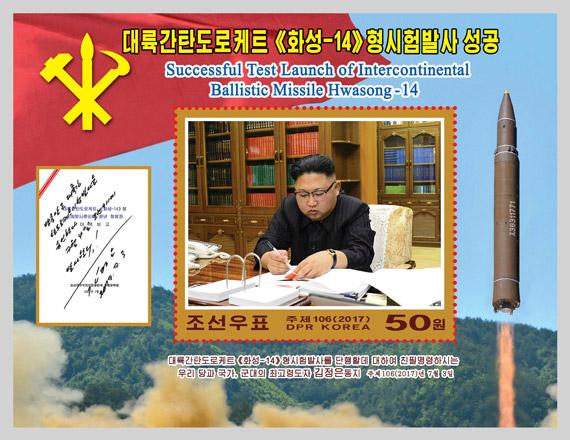You are here
Trump says ‘all options’ on table after North Korea fires missile over Japan
By Reuters - Aug 29,2017 - Last updated at Aug 29,2017

People watch a television news screen showing file footage of a North Korean missile launch at a railway station in Seoul on Tuesday (AFP photo)
WASHINGTON/SEOUL — President Donald Trump warned on Tuesday that "all options are on the table" as the United States considers its response to North Korea's firing of a ballistic missile over northern Japan's Hokkaido Island into the sea.
The test, one of the most provocative ever from the reclusive state, came as US and South Korean forces conduct annual military exercises on the peninsula, angering North Korea, which sees them as a preparation for invasion.
North Korea has conducted dozens of ballistic missile tests under its young leader, Kim Jong-un, the most recent on Saturday, in defiance of UN sanctions, but firing projectiles over mainland Japan is rare.
Trump, who has vowed not to let North Korea develop nuclear missiles that can hit the mainland United States, said the world had received North Korea's latest message "loud and clear".
"This regime has signalled its contempt for its neighbours, for all members of the United Nations, and for minimum standards of acceptable international behaviour," Trump said in a statement.
"Threatening and destabilising actions only increase the North Korean regime's isolation in the region and among all nations of the world. All options are on the table," he said.
Trump and Japanese Prime Minister Shinzo Abe spoke and agreed that North Korea "poses a grave and growing direct threat to the United States, Japan, and the Republic of Korea, as well as to countries around the world", the White House said.
The Republic of Korea is South Korea's official name.
"President Trump and Prime Minister Abe committed to increasing pressure on North Korea, and doing their utmost to convince the international community to do the same," the statement said.
The US disarmament ambassador said Washington still needed to do "further analysis" of the launch, which would be the subject of a UN Security Council meeting later on Tuesday.
"It's another provocation by North Korea, they just seem to continue to happen," US envoy Robert Wood told reporters in Geneva before a session of the UN-sponsored Conference on Disarmament.
North Korean envoy Han Tae-song told the session the United States was driving the Korean peninsula "towards an extreme level of explosion" by deploying strategic assets and conducting nuclear war drills.
In China, North Korea's lone major ally, foreign ministry spokeswoman Hua Chunying said the crisis was "approaching a critical juncture", but it was also maybe a turning point to open the door to peace talks.
Russia insisted North Korea abide by UN Security Council resolutions.
South Korea's military said the missile was launched from near the North Korean capital, Pyongyang, just before 6am (2100 GMT on Monday) and flew 2,700km, reaching an altitude of about 550km.
Four South Korean fighter jets bombed a military firing range on Tuesday after President Moon Jae-in asked the military to demonstrate capabilities to counter North Korea.
South Korea and the United States had discussed deploying additional "strategic assets" on the Korean Peninsula, the presidential Blue House said in a statement, without giving more details.
North Korea remained defiant.
"The US should know that it can neither browbeat the DPRK with any economic sanctions and military threats and blackmail nor make the DPRK flinch from the road chosen by itself," North Korea's official Rodong Sinmun said, using the initials of the North's official name, the Democratic People's Republic of Korea.
The North vows to never give up its weapons programmes, saying they are necessary to counter hostility from the United States and its allies.
Loudspeaker warnings
The United States has said before that all options, including military, are on the table, although its preference is for a diplomatic solution.
Some experts said the test appeared to have been of a recently developed intermediate-range Hwasong-12 missile, but there was no clear consensus.
Earlier this month, North Korea threatened to fire four missiles into the sea near the US Pacific territory of Guam after Trump said it would face "fire and fury" if it threatened the United States.
North Korea fired what it said was a rocket carrying a communications satellite into orbit over Japan in 2009 after warning of its plan. The United States, Japan and South Korea considered it a ballistic missile test.
The latest missile fell into the sea 1,180 km east of Cape Erimo on Hokkaido, Japanese Chief Cabinet Secretary Yoshihide Suga said.
Japanese television and radio broadcasters broke into their regular programming with a "J-Alert" warning citizens of the missile launch. Bullet train services were temporarily halted and warnings went out over loudspeakers in towns in Hokkaido.
Related Articles
BEIJING — China on Thursday blamed the "negative impact" of US military drills for tensions on the Korean Peninsula, after Pyongyang fired a
SEOUL/WASHINGTON — North Korea said on Saturday it had conducted another successful test of an intercontinental ballistic missile (ICBM) tha
BEIJING — China will pay the biggest price from the new UN sanctions against North Korea because of its close economic relationship with the














